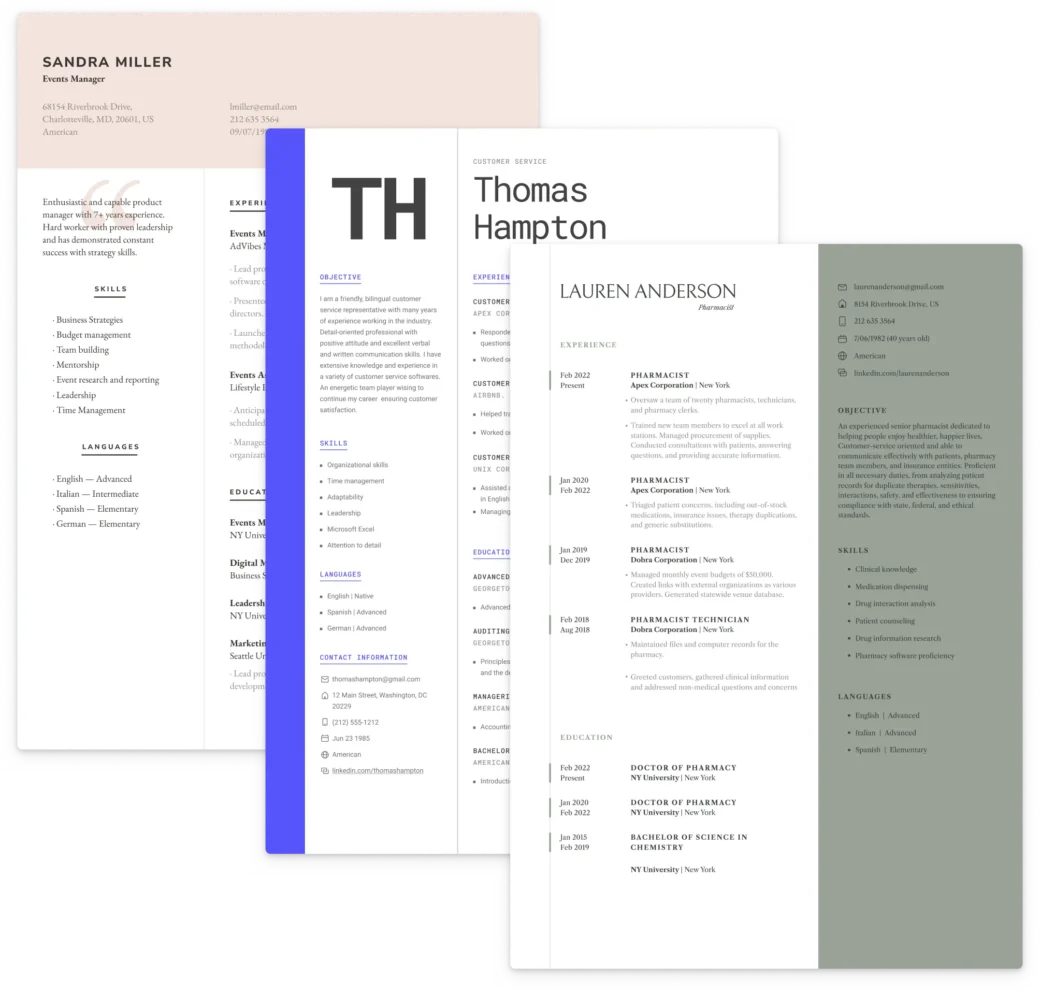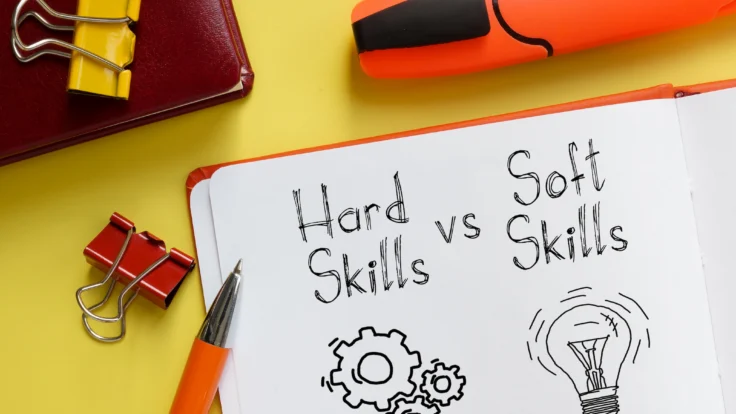Skills are an important part of your resume that tell a hiring manager you can handle your role, whether you’re an entry-level candidate or someone who is experienced.
However, not all skills are the same, and it can be difficult to know what you should highlight depending on the position you want to apply for.
Your resume should include a good mixture of hard and soft skills to ensure you’re seen as a well-rounded applicant.
Use our tips below on which skills you can include. ResumeGiants’ AI resume builder can also help you add relevant hard and soft skills with expert suggestions thanks to our free skills generator.
So, what’s the difference between hard and soft skills? Let’s dive into how to add the skills that will get you hired.
What’s the Difference Between Hard Skills and Soft Skills?
The difference between hard and soft skills isn’t that you need a chisel for one and a ladle for the other. It all has to do with their measurability and how they’re gained.
To sum up the differences between hard and soft skills, hard skills are easily quantifiable as they can be measured in results and training, while soft skills are more subjective and harder to measure.
Here’s a quick rundown of what hard and soft skills are and examples of each that you can add to your resume.
What are hard skills?
Hard skills are job-specific, measurable skills. Some may call them “concrete” — hence the term hard skills. You might also see them called technical skills. These skills are learned during training, which you can typically prove with a degree or certification.
They are essential for performing specific tasks and duties, such as programming, operating machinery, or using particular software applications, and are often a key focus in job descriptions and resumes. Hard skills are those skills that drive a business’s service or product.
In some cases, employers might test job candidates on their hard skills. Examples would include typing a certain number of words per minute, using a specific computer program or machine, displaying proficiency in a second language, or editing a document.
🛠️Hard Skills Examples
While many hard skills are job-specific, some are more general and can be applied across several industries, such as:
- Logistics software
- Project management
- Foreign language proficiency
- MS Office proficiency
- Data analysis
- Accounting and budgeting
- Technical writing and documentation
- SEO
- E-commerce and online sales
- Video editing
- Sales & lead generation
- Customer service tools
- IT support
- Legal and compliance knowledge
- Email marketing and automation
What are soft skills?
Soft skills are general, harder-to-define abilities that are more like personality or behavior traits relevant to many positions. Unlike job-specific hard skills, soft skills are broadly applicable across various roles and typically remain consistent throughout your career, though you may improve them over time.
For example, soft skills like communication and adaptability help in navigating change, recovering from setbacks, and managing emotions.
You may think that soft skills are not as essential since they are not technical, think again.
According to the 2025 LinkedIn Workplace Learning Report, 91% of learning and development professionals agree that soft skills are increasingly important.
🗣️Soft Skills Examples
Some soft skills that will be valued in most roles include:
- Communication
- Active listening
- Teamwork
- Adaptability & flexibility
- Problem-solving
- Decision-making
- Leadership
- Resilience
- Emotional intelligence
- Creative thinking
- Attention to detail
- Time management
- Negotiation & persuasion
- Self-motivation
- Relationship building
Why Employers Look for Both Hard and Soft Skills
Possessing both hard and soft skills helps show employers that you are well-rounded, can work in evolving and diverse professional environments, and that you are willing to learn and adapt as needed.
According to LinkedIn’s 2024 Most In-Demand Skills list, there is real value today in enhancing your specialist hard skills with fundamental soft skills such as collaboration and communication. These are all still crucial in the age of AI.
With a strong combination of hard and soft skills, employers will see you as someone who will use your industry-specific knowledge and capabilities to get an immediate task done while employing soft skills like problem-solving and decision-making to ensure long-term success and growth.
How To Add Hard Skills and Soft Skills to Your Resume
No matter how or where you decide to add skills to your resume, keep everything concise. Hiring managers are busy and don’t have the time (or desire) to read through dozens of bullet points’ worth of skills.
For reference, the average resume contains about 13 different skills in the skills section. Beyond the skills section, you should look to mention your skills throughout your resume to create a well-rounded resume.
💡top tip
Only include skills that are most relevant to the position you want to apply for.
Include a mix of skills in your resume summary
Your resume objective or resume summary is the first thing hiring managers read on your resume, and it’s a great spot to stick a few of your most impressive hard and/or soft skills.
They’re simply a short two-to-three-sentence description of your work experience (summary) or overall career goals (objective). Think of it like a teaser trailer to entice hiring managers to keep reading.
Here’s an example of what a good resume summary would look like — with a few skills thrown in:
Summary
Software developer with 5+ years of experience in designing and developing web applications. Proven track record of leading teams to deliver high-quality software solutions, improving system performance by 35%, and increasing user engagement by 40%. Proficient in JavaScript, Python, and React, with strong adaptability and communication skills.
Note: We have highlighted the skills here in bold type, but you should not bold your skills in your sections when you create your resume.
Create a specific skills section
The most obvious place to put your hard and soft skills is in a specific skills section.
Your skills section doesn’t need to be a long paragraph. You can demonstrate your skills in more depth in later sections. Instead, your dedicated skills section can be a simple bulleted list of your various skills or distinct lists breaking up the hard, technical, and soft skills.
Here’s a quick example of a perfectly acceptable skills section:
Additional Skills
- Data Analysis
- Project Management
- Adaptability
- Resilience
- Emotional Intelligence
- Programming (JavaScript, Python, React)
- Cybersecurity
- Technical Writing
Nowadays, it’s typical to add this section right after your summary, as hiring based on skills is on the rise.
Add hard and soft skills to your experience section
Weaving your skills into other parts of your resume is a great strategy, and your experience section is the perfect place to mention how your abilities helped you complete your tasks.
Here’s an example of what adding soft and hard skills to your experience section might look like:
Experience
Software Developer | Innovative Tech Co.
June 2019–December 2022
- Performed data analysis using SQL and Python to identify and fix bugs and improve application stability by 20%.
- Harnessed strong project management and organizational skills to manage up to 6 software development projects simultaneously.
- Promoted adaptability and continuous learning within the team by leading 10+ training sessions on new software tools and technologies.
- Collaborated with product managers and designers to create dozens of user-friendly interfaces.
Hard and Soft Skills for Different Industries
While hard skills are likely to differ across different industries, even soft skills could, in some cases, be industry-specific. For instance, mediation skills would be sought after in HR or customer service roles more than they would in a role such as transcribing, which is largely solitary work.
It’s unlikely that creativity would be a required skill for a data entry specialist. Still, it is crucial for careers in advertising, marketing, graphic design, web development, and brand management.
Let’s take a look at hard and soft skills across different industries.
Hard and soft skills for tech and IT jobs
For tech and IT professions, skills will differ depending on the exact position. For example, the skill set for a web developer is very distinct from that of a cybersecurity analyst.
The following are examples of hard and soft skills across various careers under the Tech and IT umbrella:
Soft Skills
- Adaptability
- Collaboration
- Communication
- Problem-solving
- Critical thinking
- Creativity
- Attention to detail
Hard Skills
- Programming languages
- Project management
- Data analytics
- Coding
- Database management
- Artificial intelligence
- Application development
Hard and soft skills for sales and marketing roles
It may, of course, depend on whether you are marketing online, via conferences and events, through brochures, sales calls, etc. However, here are some common skills that recruiters look for in sales and marketing candidates.
Soft Skills
- Time management
- Communication
- Active listening
- Relationship building
- Persuasion
- Collaboration
- Resilience
Hard Skills
- Product knowledge
- Data analysis
- Marketing strategy
- CRM software
- Negotiation
- Market research
- Search Engine Optimization (SEO)
Hard and soft skills in customer service and retail
Whether you work in a store, in a call center, or on a customer service desk, there are a variety of hard and soft skills you can develop to strengthen your resume.
Soft Skills
- Teamwork
- Conflict resolution
- Interpersonal skills
- Communication
- Empathy
- Positive attitude
- Active listening
Hard Skills
- Product knowledge
- CRM software
- Point-of-sale (POS) proficiency
- Data entry
- Technical support
- Digital literacy
- Inventory management
Hard and soft skills for roles in healthcare and medicine
This is a very broad area of work, but here are some examples of hard and soft skills for the healthcare and medicine sectors to help you differentiate yours.
Soft Skills
- Compassion
- Empathy
- Patience
- Bedside manner
- Organizational
- Multitasking
- Collaboration
- Attention to detail
Hard Skills
- Diagnostic skills
- Medical chart reading
- Medical terminology
- Medication administration
- First aid/CPR
- HIPAA compliance
- Electronic medical record (EMR) software
Hard and soft skills in art and design
From illustrating children’s books to designing greeting cards or the latest fashion garment, there are plenty of important skills in art and design that can grab a recruiter’s attention. Here are just a few examples.
Soft Skills
- Creativity
- Communication
- Flexibility
- Attention to detail
- Adaptability
- Critical thinking
- Time management
- Imagination
Hard Skills
- Design software proficiency (i.e., Photoshop, Illustrator)
- Typography
- Technical drawing
- 3D modeling and animation
- Basic computer skills
- Coding
- Image editing
Hard and soft skills for roles in finance
It’s important to be good at math for roles in finance, but there are many more skills that you should highlight on your resume.
Soft Skills
- Problem-solving
- Attention to detail
- Communication
- Strategic thinking
- Organizational
- Decision making
- Emotional intelligence
Hard Skills
- Accounting
- Analytical reasoning
- Budgeting
- Bookkeeping
- Financial reporting
- Risk management
- Financial analysis
Hard and soft skills when working in education
Teachers must be creative and inspiring to help their students learn. However, there are many more important skills involved in this line of work. Here are some examples.
Soft Skills
- Communication
- Adaptability
- Conflict resolution
- Collaboration
- Time management
- Creativity
- Organizational
Hard Skills
- Subject knowledge
- Classroom management
- Educational technology
- Language skills
- Digital literacy
- Instructional design
- Curriculum development
Hard and soft skills in hospitality and food service
This industry covers many roles, from working in reception at a hotel to bussing tables at busy restaurants. Here are some examples of important skills for the hospitality and food service industries.
Soft Skills
- Communication
- Customer service
- Time management
- Multitasking
- Teamwork
- Active listening
- Empathy/emotional intelligence
Hard Skills
- Reservation and booking systems
- Point-of-sale (POS) systems
- Inventory management
- Food safety/sanitation standards
- Revenue management
- Menu planning
- Multilingual communication
Because many hard and even some soft skills vary from one industry to the next, the importance of reviewing any skills highlighted in a job description or job posting cannot be overstated.
Key Takeaways
Now that you know how to show off your skills efficiently, it’s time to create a winning resume.
With our AI builder and resume templates, you can easily add your hard and soft skills, as long as you remember that:
- Hard skills are more technical, while soft skills are more about your personality
- You can list your skills right below your summary
- Include your skills in different resume sections
By including your relevant skills, as we pointed out, you’ll be able to land your dream job in no time!

Build your perfect resume with ease
Craft the perfect resume effortlessly with our builder. Get started today!
FAQs
For many recruiters, emotional intelligence is a top soft skill in 2025, according to the World Economic Forum. This ability displays a range of skills important to and much sought-after in today’s marketplace, such as relationship building, empathy, and collaboration.
Adaptability is another top soft skill that employers look for in job candidates. In fact, LinkedIn named it the ‘Top Skill of the Moment’ in 2024. Work environments are constantly evolving and changing, and the ability to stay productive and even thrive in these conditions by using your ability to adapt is a crucial skill.
Other soft skills that top LinkedIn’s research on In-Demand Skills include communication, leadership, and problem-solving.
The growing use of AI across many industries and jobs puts this hard skill at the top of many lists. McKinsey’s The State of AI in Early 2024 report found that 72% of businesses used AI in at least one function.
Beyond obvious industries such as engineering and technology, AI is increasingly being used in such diverse areas as marketing, finance, healthcare, graphic design, and education.
As many organizations become more data-driven, hard skills such as data analytics, data security, and data science are likely to be in demand.
Analyzing data is key to helping businesses make important decisions. As many companies keep important data stored on computer systems, it is becoming increasingly important to have employees who are skilled in areas of data security and cybersecurity to protect and restore this data.
Other in-demand jobs that require hard skills for 2025, according to CIO, include data engineering, software engineering, and network or cloud architecture.
To find key hard and soft skills in a job description, it’s important to read the description carefully. Take note of any technical words or phrases that are likely to indicate hard skills, such as specific programming languages or coding terms.
Be aware of any industry-specific terms as well. These might include terms such as customer service and project management or might include specific software or hardware applications.
Words accompanying phrases such as “must have”, “must demonstrate”, “must be proficient in”, or “must have experience in” are also indicative of hard or soft skills that the employer is seeking.
Possessing both hard and soft skills gives you the opportunity to present yourself as a well-rounded individual who is both adaptive and able to get the job done. You can show potential employers that you have the abilities and skills needed to complete the technical aspects of any job while having the ability to work closely with others when needed.
Related Posts

